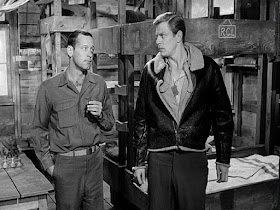 |
| William Holden and Peter Graves |
In a WW2 German POW camp, Sefton (William Holden) is a slick, callous wise guy who makes money anyway he can, whether it's from his fellow officers or from the German guards. When two hopeful escapees are discovered and shot, the other men suspect that someone in the barracks is feeding information to the buffoonish Schulz (Sig Ruman). The main suspect is Sefton, his accusers including the Security man, Price (Peter Graves); the barracks chief. Hoffman (Richard Erdman); blustery Duke (Neville Brand); and the two camp clowns, Shapiro (Harvey Lembeck) and "Animal" (Robert Strauss); among others. When it is clear that the Germans, represented by Commander Sherbach (Otto Preminger), intend to kill newcomer Lt. Dunbar (Don Taylor), who led a successful anti-German bombing raid, the group try to figure out a way to spirit him out of the camp without the quisling's knowledge. But is Sefton really the traitor? Stalag 17 might have made a great picture if there wasn't such insistence on catering to popular tastes and making a "feel good" movie about a Prisoner of War camp. No one expects Italian neo-realistic grimness in a Hollywood movie, but the comedy relief -- especially as it pertains to the bumbling and irritating Shapiro and Animal -- at times threatens to overwhelm everything else, as if it's a sitcom -- in fact, this movie with its cartoon Nazis was undoubtedly the inspiration for the series Hogan's Heroes, which even included a fumbling "Schulz". It's too bad, because the more serious aspects of the film are generally well-done. Holden gives his usual competent once-removed performance, and Graves [Beginning of the End] and Erdman [Cry Danger] and some of the others are fine, but Neville Brand is especially notable and dynamic as Duke. Holden won a Best Actor Oscar that he didn't really deserve, as it was well within his range and nothing at all special. Wilder and Strauss [September Storm] were nominated, but Brand should have been. The men in the camp talk about Betty Grable, but not once does anyone mention or even seem to think of wives and other loved ones back home aside from a brief scene when the POWs receive mail -- including letters from the finance company (!) -- from the States. [Apparently the Red Cross helped ship U.S. mail to Germany via neutral Sweden, but letters from the finance company are doubtful!] The film even tries to milk humor out of a throwaway scene when a prisoner realizes his wife is pregnant by another man but can't face up to it. (Trying not to over-sentimentalize, the movie goes to the other extreme.) There's a charming scene when the men all dance together in the absence of women.
Verdict: German POW camps as filtered through superficial Hollywood. **1/2.
I've never seen this one, as I used to have an aversion to war pictures as a kid. (Not the case anymore; I am more open minded now.) But I love William Holden, and thought he should have won the Oscar for Sunset Boulevard with Wilder. (You are right, not a hell of a lot of range as an actor but very solid, the perfect protagonist of his time...and he was a wonderful character actor when he got older, like in Network.)
ReplyDelete-C
I agree with your assessment of Holden. I, too, resisted looking at war flicks when I was younger. Then my late partner wrote a book on "The Great War Films" and I watched all of them and contributed about half a dozen essays to the book. Still, like westerns, it'll will never be my favorite genre, but a good movie is a good movie. I enjoyed these movies more than I thought I would, although, of course, they can be awfully depressing.
ReplyDelete